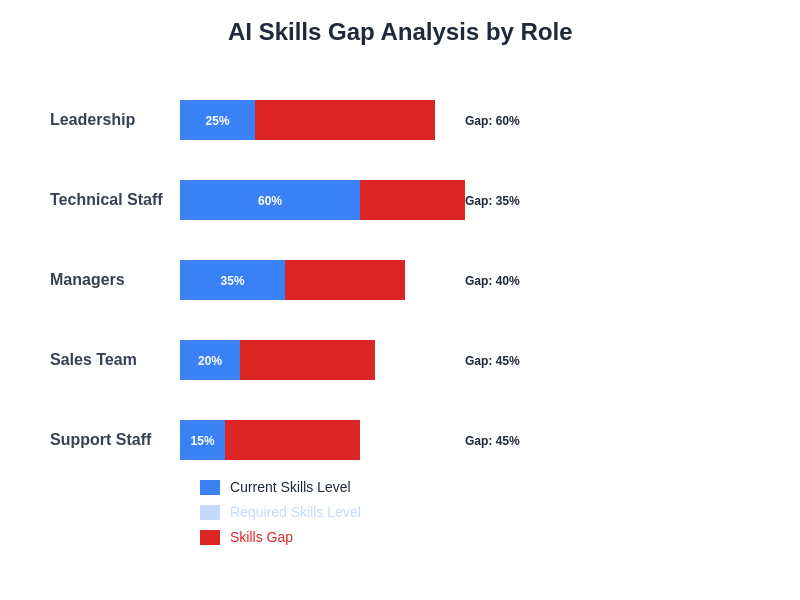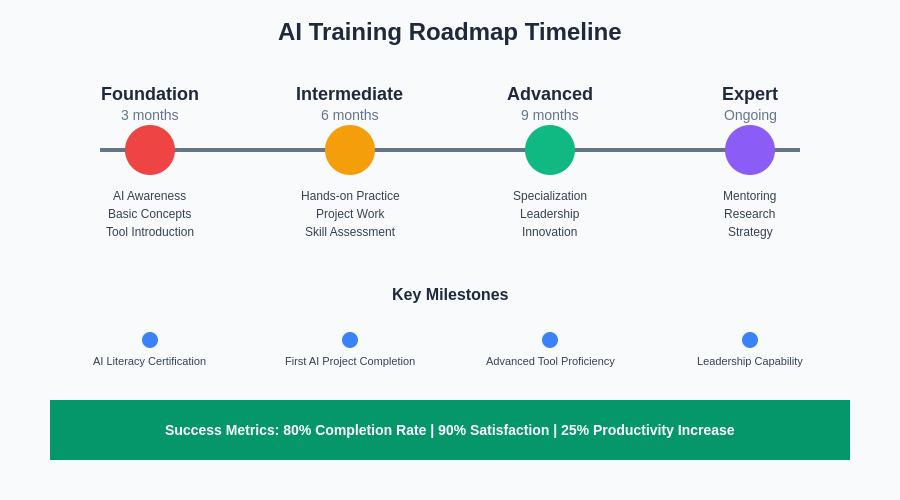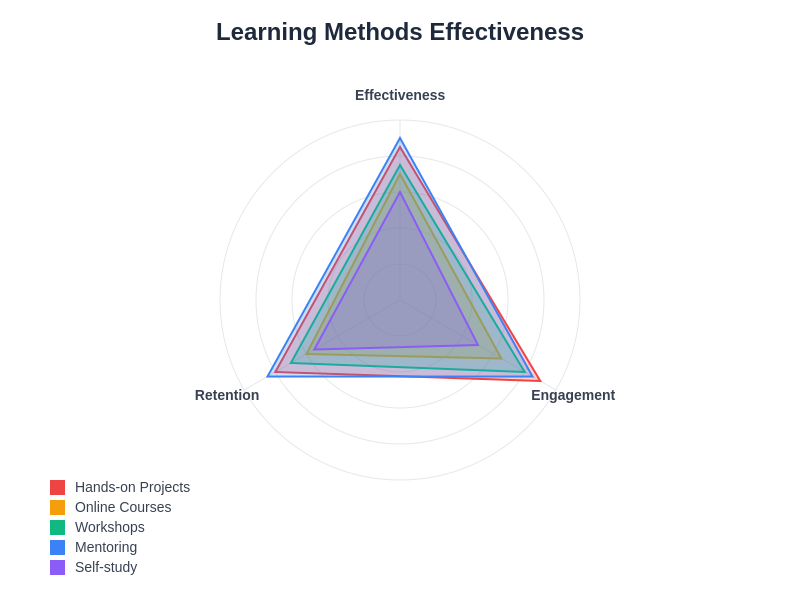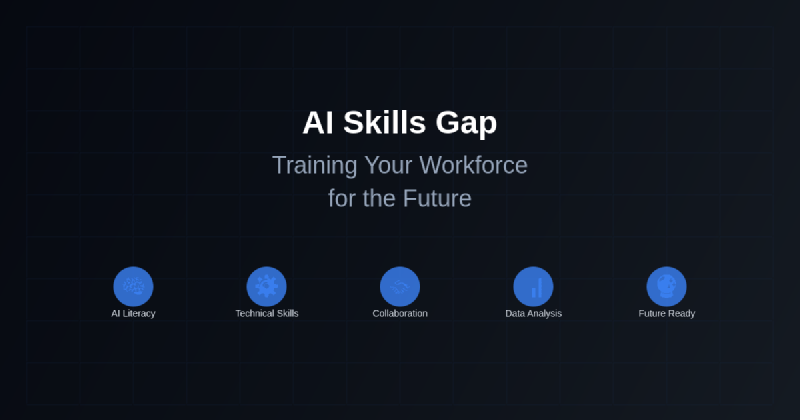The rapid advancement of artificial intelligence technologies has created an unprecedented skills gap in the global workforce, leaving organizations scrambling to equip their employees with the capabilities necessary to thrive in an AI-driven economy. This widening chasm between the skills workers possess today and the competencies they will need tomorrow represents one of the most pressing challenges facing modern businesses across every industry sector. As AI continues to reshape job roles, automate routine tasks, and create entirely new career pathways, organizations must take proactive steps to ensure their workforce remains competitive, relevant, and capable of leveraging these transformative technologies to drive innovation and growth.
Explore the latest AI workforce trends and training methodologies to understand how leading organizations are addressing the skills gap through comprehensive training initiatives. The urgency of this challenge cannot be overstated, as companies that fail to invest in AI literacy and skill development risk falling behind competitors who have successfully transformed their workforce capabilities to harness the full potential of artificial intelligence technologies.
Understanding the Scope of the AI Skills Gap
The AI skills gap manifests differently across industries and organizational levels, creating a complex landscape of training needs and development priorities. At the executive level, leaders require strategic understanding of AI capabilities, limitations, and implementation considerations to make informed decisions about technology investments and organizational transformation. Middle management needs practical knowledge of how AI tools can enhance team productivity, streamline operations, and create new opportunities for innovation and efficiency gains. Individual contributors must develop hands-on proficiency with AI-powered tools and platforms that directly impact their daily work responsibilities and career advancement prospects.
This multifaceted nature of the skills gap requires organizations to adopt comprehensive training approaches that address diverse learning objectives across different roles and experience levels. Technical teams may need deep expertise in machine learning algorithms, data science methodologies, and AI system development, while non-technical staff require functional literacy that enables them to effectively collaborate with AI systems and leverage automated tools to enhance their productivity and decision-making capabilities.

The disparity between current skill levels and future requirements varies significantly across organizational roles, with leadership positions showing the largest gaps despite having the greatest strategic impact on AI adoption success. This analysis reveals that while technical staff possess relatively higher baseline AI competencies, substantial skill development remains necessary across all organizational levels to meet evolving business requirements.
The challenge extends beyond technical competencies to include critical soft skills such as ethical AI decision-making, bias recognition and mitigation, human-AI collaboration, and adaptability to rapidly changing technological landscapes. Organizations must recognize that successful AI integration requires not just technical proficiency but also cultural transformation that embraces continuous learning, experimentation, and adaptation to emerging technologies and methodologies.
Identifying Critical AI Skills for Different Roles
The process of addressing the AI skills gap begins with comprehensive assessment of current capabilities and identification of critical competencies required for different organizational roles. Leadership positions require strategic AI literacy that encompasses understanding of market opportunities, competitive advantages, risk management considerations, and the ability to guide organizational transformation initiatives. These executives need to grasp the business implications of AI adoption, including return on investment calculations, change management requirements, and long-term strategic planning considerations that align AI initiatives with broader organizational objectives.
Technical roles demand deeper specialized knowledge spanning multiple disciplines including data engineering, machine learning model development, AI system architecture, and integration with existing technology infrastructure. These professionals must understand algorithm selection criteria, model training and validation procedures, performance optimization techniques, and the ability to translate business requirements into technical specifications that guide AI system development and deployment.
Discover comprehensive AI training solutions with Claude to accelerate your organization’s skill development initiatives through personalized learning experiences and practical application opportunities. Customer-facing roles require AI literacy focused on understanding how automated systems impact customer interactions, the ability to explain AI-driven recommendations or decisions to clients, and proficiency in using AI-powered customer relationship management tools that enhance service quality and efficiency.
Developing Comprehensive Training Programs
Effective AI workforce training requires structured programs that combine theoretical understanding with practical application opportunities tailored to specific organizational needs and role requirements. Foundational training should establish common vocabulary and conceptual understanding across all organizational levels, ensuring that employees can engage in productive discussions about AI initiatives and understand how these technologies impact their specific work responsibilities and the broader organizational mission.
Advanced technical training tracks must provide hands-on experience with relevant AI tools, platforms, and methodologies that directly apply to job responsibilities and career development goals. This includes practical workshops, project-based learning opportunities, and mentorship programs that connect employees with experienced AI practitioners who can provide guidance and support throughout the learning process.
The most successful training programs incorporate real-world case studies and pilot projects that allow employees to apply newly acquired skills in controlled environments with clear success metrics and feedback mechanisms. This approach helps reinforce learning objectives while demonstrating tangible value and building confidence in AI technology adoption throughout the organization.

A structured approach to AI skill development progresses through distinct phases, each building upon previous learning while introducing increasingly sophisticated concepts and applications. This roadmap ensures systematic capability development while providing clear milestones that track progress and maintain engagement throughout the extended learning journey required for comprehensive AI competency development.
Creating a Culture of Continuous Learning
The rapid pace of AI innovation requires organizations to establish sustainable learning cultures that adapt to evolving technology landscapes and emerging skill requirements. Traditional one-time training initiatives are insufficient for addressing the dynamic nature of AI development and the continuous emergence of new tools, techniques, and best practices that shape the industry.
Successful organizations implement ongoing learning programs that include regular skill assessments, personalized development plans, and access to current resources that keep employees informed about industry trends and technological advances. This includes subscription services to relevant online learning platforms, attendance at industry conferences and workshops, and internal knowledge sharing sessions where employees can discuss their experiences and insights with AI technologies.
Enhance your research capabilities with Perplexity to stay current with rapidly evolving AI trends and identify emerging training needs within your organization. Leadership commitment to continuous learning demonstrates organizational priorities and creates accountability systems that encourage employee participation in skill development activities while providing necessary resources and time allocation for training initiatives.
Implementing Practical Learning Approaches
Theoretical knowledge alone is insufficient for developing practical AI competencies that translate into improved job performance and organizational value creation. The most effective training programs emphasize experiential learning through hands-on projects, simulation environments, and gradual integration of AI tools into existing work processes under appropriate supervision and support structures.
Project-based learning initiatives allow employees to work on real organizational challenges using AI technologies while receiving guidance from experienced practitioners and technical support teams. These projects provide opportunities to apply theoretical concepts in practical contexts while generating tangible business value that demonstrates the effectiveness of training investments and builds organizational confidence in AI adoption strategies.
Mentorship programs pair employees with AI-experienced colleagues or external consultants who can provide personalized guidance, answer specific questions, and help navigate the practical challenges of implementing AI solutions in complex organizational environments. This approach accelerates learning while building internal expertise networks that support long-term skill development and knowledge retention throughout the organization.

Different learning approaches demonstrate varying levels of effectiveness in developing AI competencies, with hands-on projects and mentoring consistently producing superior outcomes across key performance indicators. The radar analysis reveals that traditional passive learning methods must be supplemented with active, experiential approaches to achieve optimal skill development and knowledge retention in AI-related competencies.
Addressing Resistance and Building Engagement
Workforce resistance to AI adoption often stems from concerns about job displacement, technology complexity, and uncertainty about career implications in an AI-enhanced work environment. Successful training programs address these concerns through transparent communication about organizational AI strategy, clear explanations of how AI technologies augment rather than replace human capabilities, and specific examples of career advancement opportunities that emerge from AI proficiency.
Engagement strategies should emphasize the empowering aspects of AI technology, demonstrating how these tools can eliminate mundane tasks, enhance decision-making capabilities, and create opportunities for more strategic and creative work responsibilities. Training programs that begin with immediate practical benefits and quick wins help build positive associations with AI technology while establishing momentum for more advanced skill development initiatives.
Recognition and incentive programs that celebrate AI learning achievements and successful implementation projects reinforce positive behaviors while creating peer pressure and competitive dynamics that encourage broader participation in training activities. Public recognition of employees who successfully leverage AI technologies in their work demonstrates organizational commitment to these initiatives while providing concrete examples of career benefits associated with AI skill development.
Measuring Training Effectiveness and ROI
Organizations must establish comprehensive measurement systems that track both individual skill development and organizational benefits resulting from AI training investments. Traditional training metrics such as completion rates and satisfaction scores provide limited insight into actual capability improvement and business impact generated through enhanced AI literacy and practical application skills.
Effective measurement approaches combine skill assessments that evaluate practical AI competencies with performance metrics that demonstrate improved job effectiveness, productivity gains, and innovation outcomes. This includes tracking specific projects where employees apply AI skills, measuring time savings from AI tool adoption, and monitoring quality improvements in work outputs that result from AI-enhanced processes.
Long-term tracking systems should monitor career advancement patterns, retention rates, and employee satisfaction levels among training participants compared to non-participants, providing insights into the broader organizational benefits of AI skill development initiatives. These metrics help justify continued investment in training programs while identifying areas for program improvement and expansion.
Building Internal AI Expertise
Sustainable AI capability development requires organizations to build internal expertise rather than relying exclusively on external consultants and training providers. This involves identifying high-potential employees who demonstrate aptitude for AI technologies and providing advanced development opportunities that prepare them to serve as internal champions, trainers, and technical resources for ongoing organizational AI initiatives.
Internal expertise development programs should include advanced technical training, industry certification support, and opportunities to work on cutting-edge AI projects that build both technical skills and organizational knowledge of practical AI implementation challenges and opportunities. These internal experts become valuable resources for peer training, troubleshooting, and strategic planning related to AI technology adoption and expansion.
Knowledge management systems that capture and share lessons learned, best practices, and technical solutions developed through internal AI projects help preserve and disseminate expertise throughout the organization while reducing dependence on external resources for routine AI implementation and support activities.
Integrating AI Training with Career Development
AI skill development must be integrated with broader career development planning to ensure that employees understand how AI competencies align with their professional goals and advancement opportunities. This requires clear communication about emerging job roles, evolving skill requirements, and career pathways that leverage AI expertise within the organization and broader industry context.
Career development programs should include AI skill assessments as part of regular performance reviews, with specific development plans that outline training objectives, timeline expectations, and success metrics that align with individual career goals and organizational needs. This integration helps ensure that AI training investments support both employee advancement and organizational capability development objectives.
Succession planning processes must incorporate AI literacy requirements for leadership positions, ensuring that future organizational leaders possess the knowledge and experience necessary to guide AI-driven transformation initiatives and make informed strategic decisions about technology investments and implementation priorities.
Leveraging External Resources and Partnerships
While internal capability development remains crucial, organizations can accelerate AI training initiatives through strategic partnerships with educational institutions, technology vendors, and specialized training providers who offer expertise and resources that complement internal development efforts. These partnerships provide access to cutting-edge research, industry best practices, and specialized training programs that would be difficult and expensive to develop internally.
University partnerships can provide access to academic research, student talent, and faculty expertise while offering employees opportunities to pursue advanced degrees or certifications that enhance their AI knowledge and credentials. Technology vendor relationships often include training resources, certification programs, and technical support that facilitate adoption of specific AI platforms and tools.
Industry associations and professional organizations offer networking opportunities, best practice sharing, and standardized certification programs that help employees build recognized credentials while staying current with industry trends and emerging technologies that impact their professional development and career advancement prospects.
Scaling Training Across Large Organizations
Large organizations face unique challenges in implementing comprehensive AI training programs across diverse geographical locations, business units, and employee populations with varying skill levels and learning needs. Successful scaling requires standardized curricula that maintain consistency while allowing for customization based on local requirements and specific role responsibilities.
Digital learning platforms provide scalable delivery mechanisms that accommodate different learning styles, time constraints, and geographic distributions while maintaining centralized tracking and measurement capabilities. These platforms should integrate with existing learning management systems and human resource information systems to streamline administration and reporting processes.
Regional training coordinators and local champions help ensure consistent program implementation while providing personalized support that addresses specific cultural, linguistic, and operational considerations that impact training effectiveness in different organizational contexts and geographic markets.
Future-Proofing Workforce Capabilities
The rapid evolution of AI technologies requires training programs that emphasize fundamental concepts and adaptable skills rather than focusing exclusively on current tools and techniques that may become obsolete as technology advances. Future-oriented training emphasizes critical thinking, ethical decision-making, and collaborative problem-solving skills that remain relevant regardless of specific technological implementations.
Scenario planning exercises help employees understand potential future developments in AI technology and consider how these changes might impact their roles, responsibilities, and skill requirements. This forward-looking approach helps build organizational resilience and adaptability while preparing employees for continued learning and skill development throughout their careers.
Innovation labs and experimental projects provide opportunities for employees to explore emerging AI technologies and applications while building experience with cutting-edge tools and techniques that may become mainstream in future business operations. These initiatives help organizations stay ahead of technology trends while building internal expertise in emerging areas of AI development and application.
The successful implementation of comprehensive AI workforce training programs represents a critical strategic investment that determines organizational competitiveness and long-term sustainability in an increasingly AI-driven business environment. Organizations that proactively address the skills gap through systematic training initiatives, cultural transformation, and ongoing capability development will be positioned to leverage AI technologies for competitive advantage while those that delay these investments risk falling behind more prepared competitors.
The journey toward AI-ready workforce capabilities requires sustained commitment, adequate resource allocation, and recognition that technology adoption is ultimately a human challenge that requires careful attention to change management, skill development, and cultural transformation. Success depends on viewing AI training not as a one-time initiative but as an ongoing organizational capability that adapts to evolving technology landscapes while maintaining focus on human potential and professional development.
Disclaimer
This article is for informational purposes only and does not constitute professional advice. The views expressed are based on current understanding of AI technologies and their impact on workforce development. Organizations should conduct their own assessment of training needs and consult with qualified professionals when designing and implementing AI workforce development programs. The effectiveness of training initiatives may vary based on organizational context, industry requirements, and individual employee circumstances.
